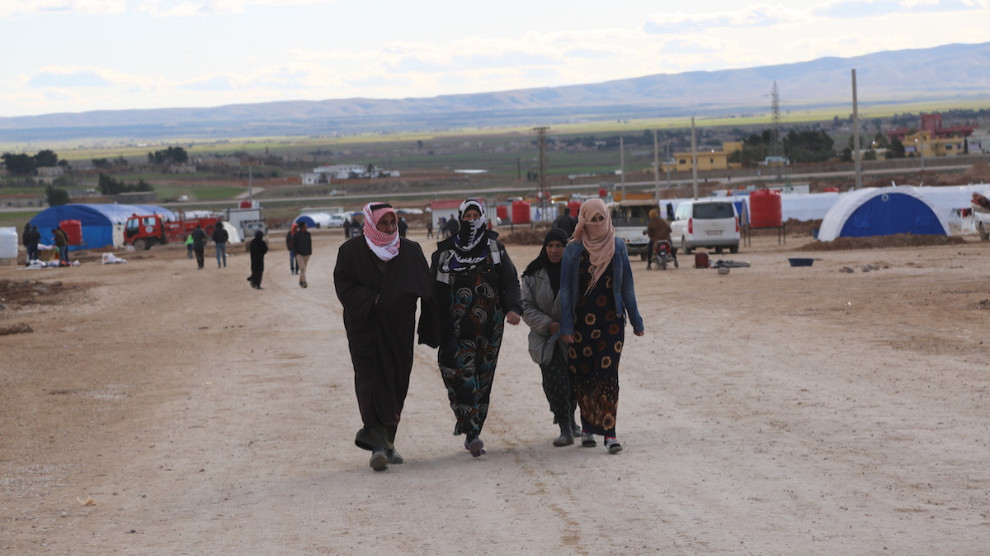The people of Serêkaniyê to Merkel: You are committing a crime!
People from Serêkaniyê told German Chancellor Angela Merkel that her support for the Turkish state invasion of Rojava / North-East Syria is "a crime."
People from Serêkaniyê told German Chancellor Angela Merkel that her support for the Turkish state invasion of Rojava / North-East Syria is "a crime."

German Chancellor Angela Merkel said in her visit to Turkey a short time ago that her government supports Turkey in the areas invaded in North-East Syria. The statements caused controversy in many circles.
The German parliament, which has recently drafted a report on Merkel's commitments, also defined the regions as "occupied areas", instead of "safe zones".
In the report prepared by the Scientific Office deputies specified that "the news coming from the zones occupied by Turkey about the security sicuration in those areas do not allow to rule out the presence of a concrete danger to life."
The report referring to the 49th article of the Geneva Convention on the Protection of Civilians in War Time, used expressions such as: "In terms of occupation law it is forbidden to transport individuals in other places."
While discussions about German Leopard tanks used during the Turkish state's invasion attacks and the killing of hundreds of civilians in the attacks continue, criticisms of Germany's attempts to legitimize the occupation also remain on the agenda.
The reaction of the people of Serêkaniyê
The people from Serêkaniyê who were forcibly displaced from their homes because of the Turkish state's invasion attacks strongly criticised Merkel.More than 350,000 civilians had to leave their homes.
The Kurdish and Arab citizens of Serêkaniyê who stay in the Waşokanî camp, which was built in the north of Hesekê after the occupation, addressed Merkel asking whether she knows to "who she is trying to hand out these lands."
An Arab citizen named Asiya Xalid, who left her home because the invasion attacks of the Turkish state and jihadist mercenaries and now has to live in the Waşokanî Camp in the north of Hesekê, says that they will never accept the occupation decision.
Asiya Xalid added: "We do not accept this. How can we give up our place, and everything to go to another place. Let them come, look at us, look at the camp, look at our children. We want to return to our home."
They speak of justice and human rights, but ...
An Arab woman named Şemse Mihemed Bekir said: "We are in the middle. But the big states don't care. They talk about human rights, they talk about justice, they hug and show love when they see a cat on the street. When it comes to people though, they forget everything."
A man called Mihemed Mûsa said: "We are in the street in the cold in winter, we are in the camps. We would like to be in our house, but now mercenaries are sitting in my house. How can I return?"
'They brought mercenaries and placed them in our homes'
Stating that the Turkish state brought many jihadist mercenaries and their families and placed them in Serêkaniyê, Şêxmûs Elî Tahir said: "They brought many mercenaries and placed them in our homes. How can we return home?"
350,000 people displaced
Waşokani Camp Officer Xalid Xelo said that after the invasion attacks of the Turkish state, more than 350,000 people were forced to migrate from the region and were scattered all over.
Stating that approximately 8,500 people live in the Waşokanî camp, Xalid Xelo added: "350,000 people have been displaced. Some of them have moved to schools in Rojava, some in schools and some have taken home."
Merkel's statements are deplorable
Talking about the statements made by Merkel, Xalid Xelo said: "They have occupied our homes, our lands. Now we are in this situation. Merkel approves this occupation and this is not acceptable."
Xalid Xelo ended his remarks by making a call: " "We call on everyone to oppose the occupation and the statements by Merkel. What they have done is a crime. Supporting the occupation is to be partners in crime."